[Dec 2007, Volume 4 Quarterly Issue] Pdf File size - The IIPM Think ...
[Dec 2007, Volume 4 Quarterly Issue] Pdf File size - The IIPM Think ...
[Dec 2007, Volume 4 Quarterly Issue] Pdf File size - The IIPM Think ...
You also want an ePaper? Increase the reach of your titles
YUMPU automatically turns print PDFs into web optimized ePapers that Google loves.
REIMAGINING INDIA<br />
‘native despot the people keep and enjoy<br />
what they produce, though at times they<br />
suffer some violence in the back. Under<br />
the British Indian despot the man is at<br />
peace, there is no violence; his substance<br />
is drained away, unseen, peaceably and<br />
subtly – he starves in peace, and peaceably<br />
perishes in peace, with law and order!”<br />
15 This was a clear recognition of<br />
the differences among the type of States,<br />
and it was a rendition of practices that<br />
each of these States had on the economy.<br />
Dadabhai, a civil society member, was<br />
elaborating on the overreach by the<br />
State and the manner in which its hegemony<br />
overshadowed the development<br />
of indigenous commercial class. <strong>The</strong> focus<br />
of the drain theory was not on the<br />
underdevelopment of the commercial<br />
class per se. <strong>The</strong> State and Commercial<br />
interest were locked into a symbiotic relationship<br />
such as to benefit the British<br />
economy. <strong>The</strong> loss to the peripheral<br />
economy was a consequence. <strong>The</strong> indigenous<br />
commercial class moved forward<br />
instead on a stunted road.<br />
If the State arose as a means to reduce<br />
the violence among interacting individuals<br />
and groups, the colonial State quiet<br />
well performed on this attribute of Statehood.<br />
Dadabhai clearly recognized this<br />
at the empirical level and wrote about<br />
this while elaborating on the arrival of a<br />
more peaceful time over that which prevailed<br />
earlier. <strong>The</strong> peaceful time that<br />
the Colonial State brought in augmented<br />
an increase in economic produce in the<br />
form of raw material that the colonizing<br />
economy required as inputs to its produce.<br />
<strong>The</strong> peripheral economy also provided<br />
the market that the Commercial<br />
interests of the class in that economy<br />
required. <strong>The</strong> peace that came in was<br />
required for the market and yet there<br />
was no getting away from the fact that<br />
the Colonial State while engaged in doing<br />
so was engendering growth of the<br />
markets for the colonizing State. Dadabhai<br />
wrote that, ‘<strong>The</strong>re is security of life<br />
and property in one sense or way, i.e.,<br />
the people are secure from any violence<br />
from each other or from Native despots.’<br />
And yet this did not secure the economy<br />
from the drain that the colonial State<br />
had established. Accordingly, ‘What is<br />
secure, and well secure, is that England<br />
is perfectly safe and secure …to carry<br />
away from India, and to eat up in India,<br />
<strong>The</strong> State and Commercial interest were locked into a<br />
symbiotic relationship such as to benefi t the British<br />
economy. <strong>The</strong> loss to the peripheral economy was a<br />
consequence. <strong>The</strong> indigenous commercial class moved<br />
forward instead on a stunted road<br />
her property at the present rate of<br />
30,000,000 to 40,000,000 a year.’ 16<br />
So clear were the State and Market<br />
relationship recognized that other members<br />
of the civil society too expressed<br />
their dissension with the practices that<br />
emerged out of this relationship. Writing<br />
in the Indian People on 27 th of February<br />
1903, Sachidanand Sinha, pointed out<br />
that the effective administration practiced<br />
during the governance of Lord<br />
Curzon was more an outcome necessitated<br />
by the requirements of commerce.<br />
‘Trade cannot thrive without efficient<br />
administration’, wrote Sinha and adding<br />
that the ‘latter is not worth attending to<br />
in the absence of profits of the former.’<br />
Consequently, it is ‘always with the assent<br />
and often to the dictates of the<br />
Chambers of Commerce (that) the Government<br />
of India is carried on’. 17<br />
This is not a place for arriving at exhaustive<br />
details of the manner in which<br />
the colonial State worked around to address<br />
the requirements of the markets.<br />
Suffice it note that the thesis of Sate and<br />
market reinforcing each other is quiet<br />
clearly observable during this period<br />
and that the members of the Indian civil<br />
society had been able to identify this<br />
relationship. It was recognition of this<br />
relationship that brought the civil society<br />
to debate about the relationship and<br />
so as to arrive at what was required to<br />
change the coordinates of the relationship.<br />
It was the cohesion of the civil society,<br />
which over the years gathered<br />
members of the commercial class that<br />
prompted the building of alternative<br />
viewpoints of the manner that the economy<br />
should function. <strong>The</strong> subsequent<br />
participation by political parties as a<br />
joint effort brought in the transition<br />
from the colonial State to a State that<br />
was part of the Indian scenario. This<br />
constitutes the second issue that merits<br />
recognition and it is that of the civil society<br />
playing an important role in influencing<br />
the changeover from the earlier<br />
State mode to that of yet another one.<br />
Post-Colonialism And <strong>The</strong><br />
Search For New Paradigms<br />
<strong>The</strong> triad of State, market and civil society<br />
as it were during the colonial pe-<br />
28 THE <strong>IIPM</strong> THINK TANK


![[Dec 2007, Volume 4 Quarterly Issue] Pdf File size - The IIPM Think ...](https://img.yumpu.com/29766298/27/500x640/dec-2007-volume-4-quarterly-issue-pdf-file-size-the-iipm-think-.jpg)
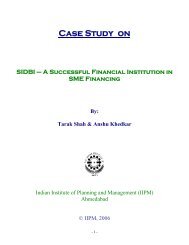
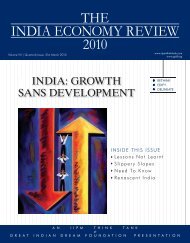
![[Feb 2008, Volume V Annual Issue] Pdf File size - The IIPM Think Tank](https://img.yumpu.com/43961117/1/190x245/feb-2008-volume-v-annual-issue-pdf-file-size-the-iipm-think-tank.jpg?quality=85)
![[June 2008, Volume V Quarterly Issue] Pdf File size - The IIPM Think ...](https://img.yumpu.com/41693247/1/190x245/june-2008-volume-v-quarterly-issue-pdf-file-size-the-iipm-think-.jpg?quality=85)
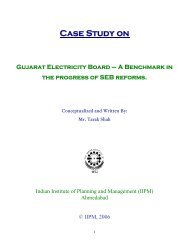
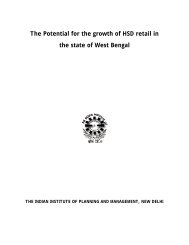
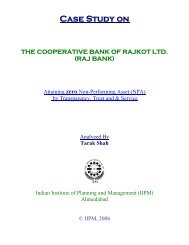

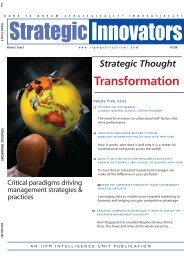
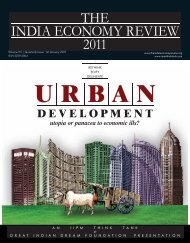
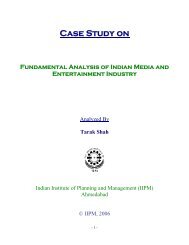
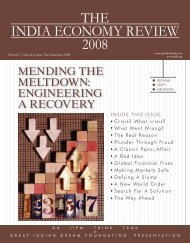
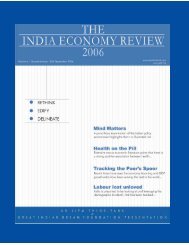
![[Volume VI | Quarterly Issue: 31st May 2009] Pdf File size](https://img.yumpu.com/27796051/1/190x245/volume-vi-quarterly-issue-31st-may-2009-pdf-file-size.jpg?quality=85)